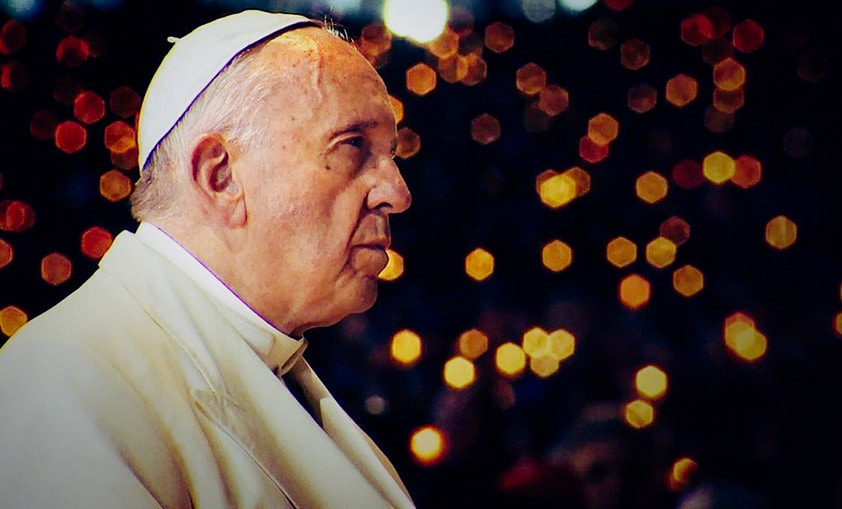Is ‘Pope Francis: A Man of His Word’ worth a movie date night? Yes! Although the documentary about Pope Francis doesn’t reveal much about his life, it does provide invaluable insights into the issues that drive the pontiff. It also emphasizes the place for faith and the Roman Catholic Church in the modern world. This fascinating, moving documentary is an alternative to the usual date flick.
The world has regarded Pope Francis with fascination since his surprising ascendancy to the Chair of Peter in 2013. He is the first Jesuit ever elected to the papacy, as well as the first pope from the Americas. Argentina’s Cardinal Jorge Mario Bergoglio was certain to bring a different perspective to the complex issues he faced in the world.
Throughout his papacy, Pope Francis has focused on the environment. He frequently calls for economic justice. His warm, welcoming attitude draws in those distanced from Catholicism. However, Pope Francis has stirred plenty of debate throughout his six years as the leader of the Roman Catholic Church.
In the new documentary “Pope Francis: A Man of His Word,” acclaimed German director Wim Wenders (“Wings of Desire,” “Buena Vista Social Club”) shines a spotlight on the philosophical side of the pontiff. The film reveals that the pope’s choice of name might be the most important key of all to understanding his time as the leader of the Church.
Acclaimed director Wim Wenders offers insights into the film
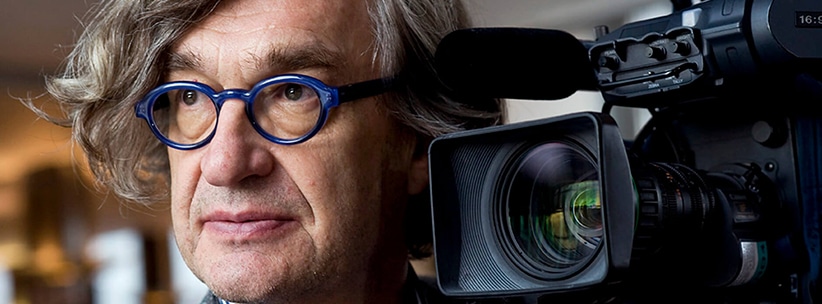
Surprisingly, this movie was not born from Wenders’ own desire to pursue the pontiff. Rather, inspiration came from the Vatican. They requested the Catholic, “ecumenical Christian” filmmaker to help provide an in-depth platform for Pope Francis’ philosophy.
“One day, a letter by the Vatican arrived in my office. Would I be inclined to discuss a project with them involving Pope Francis?” explained Wenders in an interview with Angelus News.
Wenders said he’d been excited about the new pope from the moment he’d heard his choice of name.
“Francis! Wow! What a promise that was!” Wenders said. “No pope had ever dared to take up this name. It stood for a radical identification with the poor and the outcast and it was synonymous with a deep care for nature and ‘our sister Mother Earth.’”
The German filmmaker eventually met with Msgr. Dario Viganò, then the director of Vatican Television. Wenders said Msgr. Dario Viganò promised him that the project would be “an independent production and that the Vatican was not going to interfere.”
“He kept his promise,” Wenders added.
A secret project with worldwide implications
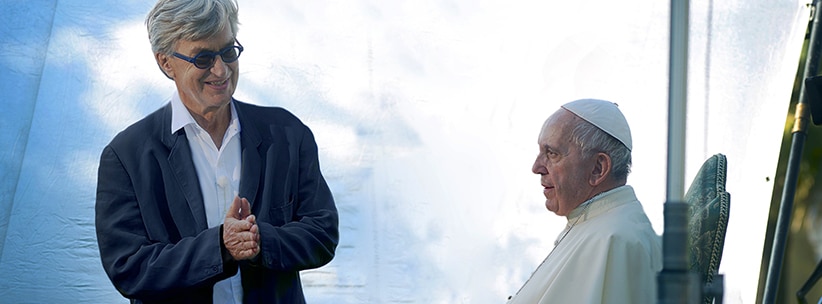
Wenders filmed the pontiff in four two-hour sessions over a two-year period. He allowed Pope Francis to speak in his native Spanish for all the interviews. Wenders kept the project secret until filming was completed. The film made its recent worldwide debut at the Cannes Film Festival this spring.
The director rejected a traditional documentary structure in which Pope Francis’ life is depicted from childhood through the present. Wenders does not cover the pre-papacy years aside from opening with footage of Pope Francis speaking to a small crowd in a park while serving as Archbishop of Buenos Aires in 1999.
Then, the film jumps to the dramatic night in which Pope Francis was introduced to the world from a Vatican balcony.
After the footage of the night of his election as pope, Wenders shows the pontiff answering questions from young children. His interaction with youngsters sets an important precedent for the rest of his teachings in the documentary. Pope Francis places extreme emphasis on the importance of family life and parents playing with their children.
A fierce determination to fight abuse
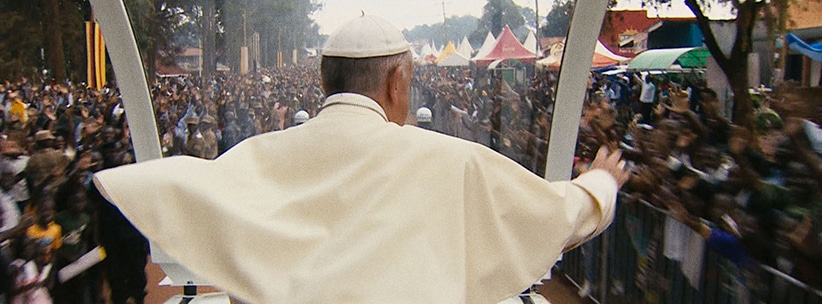
In his most stirring comments, Pope Francis expresses his fierce resolve to cure the Church of pedophilia. He discusses his determination to remove pedophile priests from their pastoral duties.
The film spends the majority of its time following the pontiff around the world to troubled zones. Pope Francis spends time in the poverty-ridden heart of Africa and the hurricane-stricken Philippines. The film also shows Francis’ time in a European prison and a Greek refugee camp amid Europe’s immigration crisis.
These sequences are emotionally affecting. But, the film also feature Pope Francis commenting about man’s destruction of the environment and economic inequality. This might make politically conservative Catholics a little uncomfortable. Another scene shows the moment when the pope stirred controversy by saying that, if those who experience homosexual attraction strive for a relationship with God, “Who am I to judge?”
Ultimately, the film is invaluable for understanding Pope Francis’ opinions and inspirations. It should be a great conversation-starter among Catholics trying to understand the role of the Church in the present age.
A modern revolutionary inspired by a historic one
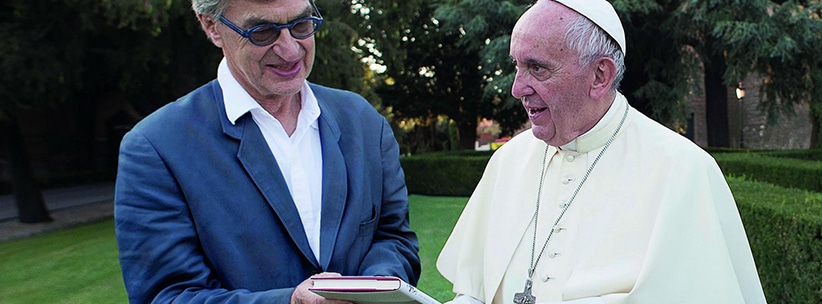
Wenders serves up a couple of lengthy sequences covering the life of the pontiff’s patron saint, Saint Francis of Assisi. The director describes Saint Francis as a “revolutionary”
who believed that true Christian ministry required embracing poverty over materialism. The saint also believed that proper stewardship of the planet is an essential part of being a believer.
What shines through and transcends any potential controversies in the pope’s comments is the highly intimate approach Wenders took in filming the pontiff.
“What I most wanted to share was the privilege to be eye to eye with the pope. To look into these utterly friendly, kind, curious, open and tender eyes was something I couldn’t just keep for myself!” explained Wenders.
“So I decided to shoot our long and intense talks in a way that Pope Francis is now eye to eye with everybody in the audience. I wanted people to be able to listen to the pope as attentively as possible and to see him as intimately as possible.”
High technology enabling an intimate human connection
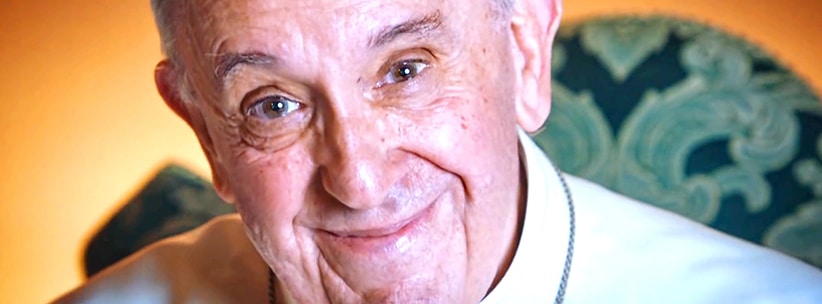
The conversations between the director and the pontiff were filmed using an elaborate “reversed teleprompter” apparatus. This method allowed the pope to speak directly into a camera-equipped monitor showing Wenders, who was actually a few steps away.
“We were both involved so intensely in our conversation that we totally forgot this technical medium in-between,” recalled Wenders.
In the end, Wenders felt working on the film deepened his own faith, both in his personal sessions with the pope and especially observing his comments in detail repeatedly throughout the editing process.
“It did have a great impact on me, particularly his positive and optimistic energy, his confidence in God, his humility, his courage, his kindness … they were all contagious and a huge inspiration.”
